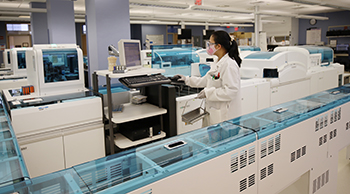
Popular Locations
- Yale New Haven Children's Hospital
- Yale New Haven Hospital - York Street Campus
- Yale New Haven Hospital - Saint Raphael Campus


YNHH Chemistry Laboratory medical technologist Rina Le recently conducted tests using some of the Lab’s advanced technology. The Chemistry Lab performs nearly 6 million tests a year.
Myles McGowan never meets the patients he helps care for, but he knows a lot about them.
In just a small blood specimen, McGowan and his fellow medical technologists in Yale New Haven Hospital’s Clinical Chemistry Laboratory can spot microscopic evidence of a wide variety of conditions. They can also help determine if medications and other treatments are working, perform toxicology tests and identify even subtle changes that indicate improvement or worsening of patients’ illnesses.
“A career in medical laboratory science not only offers a complex analytical component, but also indirect patient care,” McGowan said. “The beauty of the job is knowing that my actions have a direct impact on the medical team’s decisions for patient treatment.”
Chemistry is one of 12 sections in YNHH’s Department of Laboratory Medicine. Others are Hematology, Immunology, Flow Cytology, Virology, Microbiology Molecular Biology, Microbiology, Tumor Profiling, Blood Bank, Point of Care, Blood Gas and Central Processing.
The Chemistry Lab performs nearly 6 million tests a year, many of which are routine blood tests physicians order as part of a patient’s annual physical. These specimens are often analyzed by highly advanced instrumentation, freeing up technologists to perform complex, specialty tests, such as those that determine how well anti-rejection medications are working for transplantation patients and the effectiveness of anticonvulsant medications for patients with epilepsy.
“Medical technologists are the behind-the-scenes detectives,” said Jasmine Messina, Clinical Chemistry Laboratory manager. “Lab results are used to confirm 80 percent of diagnoses, so we must be meticulous, not in only conducting tests, but ensuring the results are accurate.”
Advanced technology introduced in the past few years is helping YNHH Chemistry Lab technologists perform even more tests, more quickly and with smaller blood samples. The lab can now run certain tests 24/7.
One of those tests can help detect intrahepatic cholestasis, a late-pregnancy disease that can be life-threatening to the baby. Previously, the Lab sent samples outside the hospital for testing, which took six or more days. With new analyzers, the Lab can perform the test in-house and get results within four hours.
In addition to new equipment, the Chemistry Lab implemented new software at all its YNHH locations. The upgrades improved testing capabilities and laid the groundwork for system standardization, Messina said.
While the Virology Lab is handling most of the COVID-19 testing, the Chemistry Lab is performing certain specific tests and providing resources to Virology.
“With the increase in workload and stress all healthcare providers are experiencing now, it’s especially important for them to have accurate, reliable results for their patients,” McGowan said. “Knowing that we’re helping providers make a difference in patient outcomes is the most rewarding part of our jobs.”
Medical technologists are in high demand, at YNHH and nationwide. To learn more about becoming a medical technologist, contact Jasmine Messina at [email protected] or 203-688-8853.